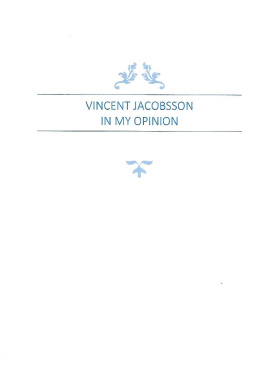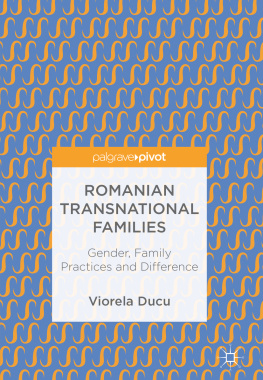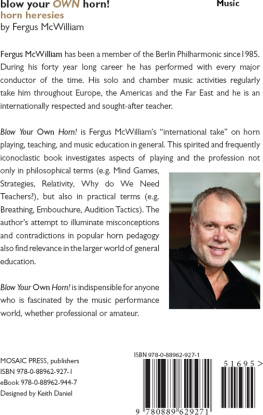Aging within Transnational Families
Aging within Transnational Families
The Case of Older Peruvians
Vincent Horn
Anthem Press
An imprint of Wimbledon Publishing Company
www.anthempress.com
This edition first published in UK and USA 2019
by ANTHEM PRESS
7576 Blackfriars Road, London SE1 8HA, UK
or PO Box 9779, London SW19 7ZG, UK
and
244 Madison Ave #116, New York, NY 10016, USA
Copyright Vincent Horn 2019
The author asserts the moral right to be identified as the author of this work.
All rights reserved. Without limiting the rights under copyright reserved above, no part of this publication may be reproduced, stored or introduced into a retrieval system, or transmitted, in any form or by any means (electronic, mechanical, photocopying, recording or otherwise), without the prior written permission of both the copyright owner and the above publisher of this book.
British Library Cataloguing-in-Publication Data
A catalogue record for this book is available from the British Library.
ISBN-13: 978-1-78308-906-2 (Hbk)
ISBN-10: 1-78308-906-7 (Hbk)
This title is also available as an e-book.
To Joki and Adi
CONTENTS
ILLUSTRATIONS
Figures
Tables
This study would not have seen the light of day without the support and sacrifice of many individuals. From the very first idea taking shape in Seville, until the last sentence written in Mainz, I was advised and accompanied by experienced researchers, who encouraged and stimulated my work. I still have the folder with the first set of chapters on transnational family care that Angeles Escriv transferred to my USB flash drive when I was visiting her in Huelva in 2009. Her openness to my idea was key to developing a research proposal and her willingness crucial for getting in contact with the wider research community.
I would like to thank Loretta Baldassar for her positive feedback on my early work and also the members of the IMISCOE Standing Committee on Ageing Migrants: Demography, Agency and Welfare for the stimulating exchanges during our inspiring annual meetings. Valuable advice and feedback came also from the members of the Research Training Group Transnational Social Support at the Universities of Hildesheim and Mainz. The Research Training Group offered excellent conditions for conducting my research as well as for growing as a researcher.
My special gratitude goes to my supervisor Cornelia Schweppe. Her contributions of time, ideas and confidence made this study a productive and fulfilling experience. Thanks to her, the study felt less like an immense burden and more like a surmountable, perhaps even enjoyable challenge. I am very much looking forward to collaborating and discovering new grounds together. I am also very grateful to my two other supervisors, Anita Bcker and Matthias Witte. Their experience, creativity and reliability are highly appreciated. That this study has become readable is owed to Manuela Popovici and her outstanding proofreading skills.
Last, I would like to thank my parents and family-in-law for their emotional, practical and hands-on support in both difficult and smooth times. The unconditional care received from Julia and Prescilia after the birth of Joki and Adrian still impresses me. I take my hat off to Karinas courage and effort in moving to Germany and passing through a seemingly never-ending and frustrating process of professional and personal recognition. That she took on all the hurdles makes me very proud and optimistic for the future. Also invaluable has been the time I spent with Joki and Adrian, whose laughter, love and liveliness made worries vanish and reminded me of the really important things in life.
Transnational migration studies experienced a veritable boom during the past few decades. Several strands of related research emerged in different academic fields, studying a multitude of migrants economic, cultural, social and political practices and relationships across national borders (Levitt & Jaworsky ).
A series of symposia, several conference panels and a rapidly increasing number of book chapters (Torres ). This study is primarily aligned with the fourth strand of research.
A primary interest of researchers in this field is the multifaceted and asymmetric character of relationships between family members and how these relationships transform by being subjected to spatial separation (Srensen & Vammen 2014: 92). In other words, transnational family scholars ask how and why family members primarily migrants maintain ties across borders, focusing on changing patterns, practices and dynamics underlying their transnational family life. According to Bordone and de Valk ().
Older family members left behind in the country of origin are generally not considered as active participants in the making of transnational family life. However, the non-migrant grandparent who, along with her migrant children, is jointly responsible for income generation and raising children across borders engages in comprehensive, core transnational behaviours, although she may only travel once a year (Levitt : 207), older people also appear to be manifoldly entangled in transnational processes and relationships.
However, empirical evidence of the scope and structuring features of older peoples transnational family involvement remains scarce. In fact, the bulk of research in this field is in the form of qualitative case studies. While these studies scrutinize the complexity of older peoples transnational behaviour and identities, they say little about the spread of this phenomenon. Also rather little is known about the relationship between age and/or specific stages in the life course and the type and extent of family members transnational engagement. Likewise scarcely researched is the association between different migration regimes and transnational families lives (Merla & Baldassar : 362).
This cumulative study aims to narrow some of these research gaps through the study of older Peruvians transnational family ties and practices. It does so in the form of five chapters which are framed by the overall research question of how, why and to what extent older Peruvians engage in family-related cross-border activities and relationships. Besides the older Peruvians motivations and experiences, a particular analytic focus lies on the political and institutional contexts surrounding their transnational involvement. Accordingly, some of the research questions addressed in the different chapters are: Why and to what degree do older Peruvians engage in transnational practices, and how is this engagement shaped by local and transnational contexts? How do stages in life relate to specific types of transnational involvement, and how is this relationship mediated by the Peruvian migrants structural integration and transnational ties? What is the impact of geographical distance and factors related to different host societies on Peruvian migrants patterns and structuring features of cross-border mobility and immobility?
Theoretically, this study draws on the care circulation framework as proposed by Baldassar and Merla (: 4), the study adds empirical insights into the role and activities of individual actors within transnational families.
The book is structured as follows: In the empirical outcomes are presented in the form of five essays on different aspects of transnational family life in old age. The book closes with some concluding remarks about research on aging within transnational families.







